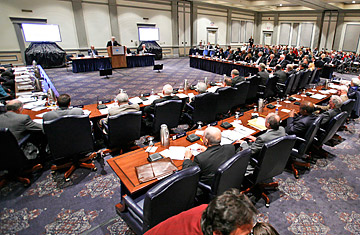
The Penn State board of trustees meets in the wake of the firing of football coach Joe Paterno and school president Graham Spanier on Nov. 11, 2011
Pennsylvania education secretary and Penn State trustee Ron Tomalis spoke with TIME about the special committee the university's board of trustees created on Nov. 11 to investigate the culture at Penn State and what led to the grand jury indictments of two school officials and former football coach Jerry Sandusky, regarding his alleged sexual abuse of boys on school facilities. Fellow trustee Ken Frazier, the CEO of Merck and a graduate of Penn State, will chair the committee. Tomalis is vice chair.
TIME: How can people have confidence that this will be an independent investigation and break through what is obviously a tightly connected group of folks in power?
First of all, the chairman, the CEO of Merck, is an individual of very high caliber and talent who is helping to oversee this committee. And I am a state official. I'm not a Penn State alum. I have no relationships with Penn State except for my position on the board as a state official. We're also bringing in outsiders. The outside counsel will have no connection with Penn State, and [these lawyers] will be the ones who will be doing the investigation. And it is our intent to make their investigative report totally public. We are not limited in our scope, except that we cannot interfere with the attorney general's criminal investigation that is still ongoing.
Given how influential Penn State is within Pennsylvania, do you think it is likely you'll get a firm that is based outside the state?
I think it's likely that we will do that.
Did you see the article in late March in the Harrisburg Patriot-News, where a reporter got ahold of a lot of grand jury details and pretty much laid out the Sandusky case?
I did see the reports in the Patriot-News.
Was there any reaction to those reports?
Well, they were secret grand jury proceedings, so there wasn't much that could be done because those were all private grand jury proceedings.
But they were publicly discussed in late March.
Correct.
Was there any planning for a course of action in the event that the attorney general would go public with the investigation? Were there any discussions about preparing for the worst?
Not that I was a part of. I don't know if it was part of the discussion among [school president Graham] Spanier's leadership, but not that I was a part of.
Up until now, could anybody in Pennsylvania control Joe Paterno?
Well, that's one of those areas, the relationship between the football program and administration and the board of trustees, that will be part of the examination that the special committee will be looking at. It was a complete shock when the grand jury indictment came out and when people actually sat down and read the 23 pages of what was alleged to have happened during the time that Sandusky was the coach for, or was still involved either indirectly or otherwise with, Penn State University.
Will your committee have the authority to compel people to meet with your committee, to compel their testimony?
We will be approaching every individual who we believe, through our outside counsel, can provide us information that can get us to what we need to know as to what happened at Penn State. And we certainly hope or would expect as much cooperation as possible.
Will university employees be at risk of losing their jobs if they don't cooperate?
We have the commitment of the current leadership of Penn State to cooperate fully in any way that we can, so as we begin to have our outside counsel proceed with the investigation, if there are individuals or times when we hit a roadblock, we'll address those when we get to it.
You said your plan is to make the entire report public. How does the possibility of civil lawsuits complicate your mission?
We wouldn't be surprised if there are some potential civil lawsuits. But it's the commitment of the board to get to the answers wherever they may be, regardless of the consequences. We need to know what happened because of this incident. The board is extremely committed to finding out what happened, regardless of where it may take us and the consequences of this discovery.
